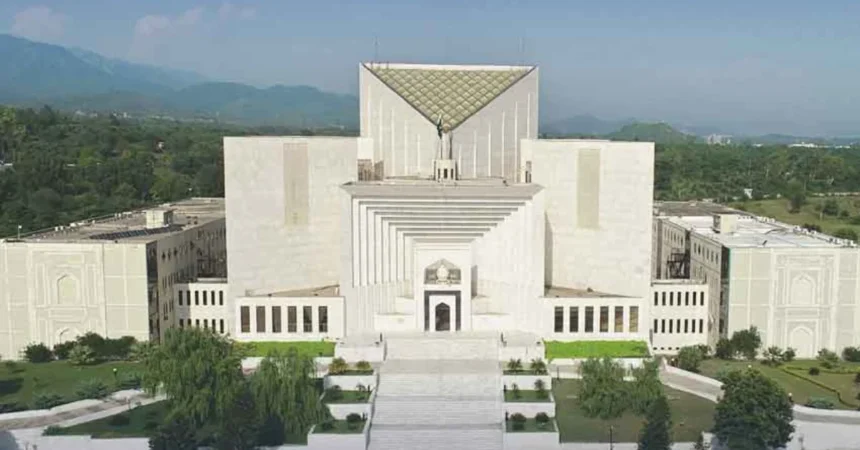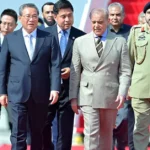The Supreme Court of Pakistan has reiterated its decision regarding the allocation of reserved seats to the Pakistan Tehreek-e-Insaf (PTI), instructing the Election Commission of Pakistan (ECP) to comply with its ruling. This verdict, initially delivered on July 12, 2024, solidifies the PTI’s position to secure its representation through reserved seats, despite legislative amendments that attempted to overturn the decision.
Court’s Clarification
In a recent clarification, an eight-member bench of the Supreme Court, led by Chief Justice Qazi Faez Isa, declared that the amendments to the Election Act do not have retrospective application and thus cannot impact the court’s previous verdict. The court emphasized that the ECP is legally bound to implement the ruling and issue notifications regarding PTI’s reserved seats without seeking further clarification.
This development follows the court’s ruling in a case that saw the Peshawar High Court and the ECP initially blocking the PTI from claiming its reserved seats. The July ruling was based on an 8-5 majority decision, which overruled the previous judgments and declared the PTI eligible for these seats.
The clarification specifically addresses concerns raised by the ECP, which sought further instructions on whether the amendments to the Election Act could negate the court’s decision. However, the Supreme Court firmly stated that no legislative change could retroactively affect its rulings.
PTI’s Eligibility for Reserved Seats
The reserved seats in question relate to the PTI’s status as a political party and its representation in both the National and provincial assemblies. The court highlighted that PTI’s position as a legitimate political entity remains intact, and as such, its reserved seats must be honored.
The PTI had initially been denied these seats due to its disqualification from contesting elections under the provisions of the Election Act. However, the Supreme Court intervened, overturning the disqualification and ensuring PTI’s entitlement to these seats.
The Court’s Legal Rationale
The Supreme Court based its ruling on the principle that PTI, as a political party, has the right to representation under Pakistan’s constitutional framework. The Election Act, which disqualified PTI from contesting elections, could not retroactively negate the party’s entitlement to reserved seats. The court emphasized that legal amendments cannot strip PTI of rights that were already established before the changes.
Overturning the Disqualification
The PTI was previously disqualified from securing its reserved seats, following amendments in the Election Act. However, the Supreme Court deemed this move unconstitutional. By overturning the disqualification, the court affirmed that PTI’s political legitimacy was unaffected by legislative changes, and its members should be seated in both National and provincial assemblies.
Reserved Seats in National and Provincial Assemblies
The Supreme Court’s ruling applied not just to the National Assembly but also to the provincial assemblies of Punjab, Khyber Pakhtunkhwa, and Sindh. PTI’s representation in these assemblies will now proceed based on the party’s submitted lists. These reserved seats are particularly critical for the party as they bolster its political presence across multiple legislative bodies.
Impact on Future Elections
This decision sets a crucial precedent for future elections, ensuring that no political party can be denied reserved seats due to subsequent legislative changes. The ruling affirms the continuity of political rights and representation, guaranteeing that parties like PTI can retain their seats based on earlier eligibility criteria.
The Supreme Court’s decision not only secures the PTI’s reserved seats for current assemblies but also strengthens the integrity of future electoral processes. Political parties can now be confident that their seats will be protected from arbitrary legislative changes, ensuring fair representation.
Moreover, the ruling creates a legal safeguard, reducing the risk of future political conflicts regarding reserved seats. By upholding the PTI’s right to its seats, the Supreme Court has set a standard that future governments and election commissions must follow, fostering consistency in electoral outcomes.
Reserved Seats Across Provinces
The court’s ruling is not limited to the National Assembly but extends to the provincial assemblies as well. Specifically, the PTI will receive reserved seats in Punjab, Khyber Pakhtunkhwa, and Sindh, where its representation was previously in question. The court has instructed the ECP to issue notifications for these seats based on the list provided by the PTI.
The court has also mandated that any candidates affiliated with the PTI must submit affidavits confirming their party allegiance. This process will determine the final allocation of reserved seats, ensuring that the PTI secures its rightful representation in accordance with the court’s ruling.
ECP’s Role in Implementing the Verdict
The Election Commission of Pakistan now bears the responsibility of enforcing the Supreme Court’s decision. This includes verifying the list of candidates provided by the PTI and issuing formal notifications for the reserved seats. The court has given the ECP 15 days to complete this process, ensuring that there is no further delay in implementing the verdict.
The ECP had previously expressed concerns about the impact of the Election Act amendments on the court’s ruling, which prompted the request for clarification. However, with the court’s firm stance, the ECP is now obligated to proceed with the implementation of the decision without further hesitation.
Political Implications
The Supreme Court’s decision holds significant political implications for the PTI and its leadership. By securing these reserved seats, the PTI will be able to maintain its presence in the National and provincial assemblies, even as it faces legal challenges and political opposition.
For the PTI, this ruling represents a major victory in its ongoing battle to retain its political standing. Despite the setbacks caused by its disqualification and the legislative amendments aimed at curtailing its influence, the party has managed to secure a favorable outcome in the courts.
The decision also underscores the judiciary’s role in upholding the rule of law and ensuring that political parties are not unfairly excluded from the democratic process. By reaffirming the PTI’s eligibility for reserved seats, the court has reinforced the principle that political representation cannot be arbitrarily denied.
Challenges Ahead for the PTI
While the Supreme Court’s ruling is a clear victory for the PTI, the party still faces numerous challenges as it navigates the political landscape. The ongoing legal battles, particularly those related to its leadership and internal structure, pose significant hurdles for the party.
Moreover, the political environment in Pakistan remains highly volatile, with multiple parties vying for control in the lead-up to the next general elections. The PTI’s ability to secure reserved seats may bolster its standing, but it will need to address the broader issues facing its leadership and organizational structure to fully capitalize on this victory.
The Supreme Court’s decision to uphold the PTI’s entitlement to reserved seats marks a critical moment in Pakistan’s political landscape. By instructing the Election Commission to implement its ruling, the court has ensured that the PTI will maintain its presence in both the National and provincial assemblies.
This verdict not only secures the PTI’s representation but also reaffirms the judiciary’s role in safeguarding democratic principles. As the political situation in Pakistan continues to evolve, the PTI will need to navigate these challenges carefully to consolidate its position and prepare for future elections.
#PakistanPolitics #PTI #SupremeCourt #ECP #ReservedSeats #Election2024 #PakistaniJudiciary







